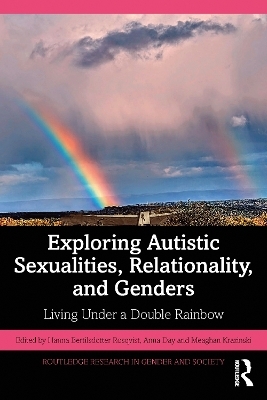
Exploring Autistic Sexualities, Relationality, and Genders
Routledge (Verlag)
978-1-032-57611-4 (ISBN)
This edited collection of contributions explores non-normative genders, sexualities, and relationality among Autistic people.
Written within an explicitly neuro-affirmative frame, the collection celebrates the diversity and richness of Autistic identity, sexuality, gender, and relationships, exploring areas such as consent, embodiment, ink, kink, sex education, and therapeutic work. All editors and contributors are neurodivergent and members of the communities that the book focuses on, providing an authentic and unique exploration of gender, sexuality, and relationality in Autistic people by Autistic/other neurodivergent authors.
The book is primarily intended for postgraduate students and academics across disciplines including sociology, social work, psychology, disability studies, inclusive and special education, and sexual education. Mental health professionals and educators will also find it a useful resource to support their Autistic clients as well as developing their own understanding about how to support Autistic people in a neurodiversity-affirming, kink-affirming, LGBTQ+, and gender-variant way.
Hanna Bertilsdotter Rosqvist is a sociologist and a Professor in Social Work at Södertörn University, Sweden. Her research focuses on research methods and theory development within Neurodiversity Studies. She has published several papers on the theme of gender and sexuality, among Autistic people as well as among non-autistic people. She has edited several books, among them Neurodiversity Studies: A New Critical Paradigm (edited by Hanna Bertilsdotter Rosqvist, Nick Chown, and Anna Stenning, 2020). Anna Day is a neurodivergent principal clinical psychologist and parent to an Autistic young person. Anna has extensive clinical experience in the United Kingdom’s National Health Service (NHS) in a community mental health team and specialist psychological therapies service, and now works for The Adult Autism Practice, Dublin, within a neuro-affirmative approach with adults seeking Autism identification. They have a particular interest in gender, sex, and relationship diversity issues and neuroqueering. Anna and colleagues have published the successful Adult Autism Assessment Handbook: A Neurodiversity Affirming Approach (2021) and are working on The Neurodiversity Affirmative Child Autism Assessment Handbook. Meaghan Krazinski is a neurodivergent PhD candidate in Inclusive Special Education at Syracuse University, United States. Her research interests include neurodiversity; neurodivergent college student experiences; inclusive education; Autistic identity, gender, and relationality; and arts-based research methods. She has published work on Autistic understandings of gender, race, and identity in Hypatia: A Journal of Feminist Philosophy, and an analysis of Disabled students’ experiences with online learning using a queer phenomenological method, as well as a forthcoming co-authored work on neuroqueering, education, and culturally sustaining practices.
Part I: Introduction
1. Introduction
2. Intermission on Consent
Part II: Beginnings
3. Being Young, Autistic, and LGBT+: Connections, Influences, and Identity Negotiations
4. Shifting Paradigms in Gender-Diverse Autistic Research
5. The Power of Community-Generated Data for an Epistemic Shift in Autistic Sexuality: From Stigmatised to Neuroaffirming Sex
Part III: Evolving Understandings: Naming the Nameless So It Can Be Thought
6. Autiqueer Experiences of BDSM: Desire, Communication, and Terminology for BDSM Practices
7. Autistic Identity as a Springboard into Exploring Queerness, Embodiment, and Relationality
Part IV: Unlearning, Relearning
8. "What We Are Taught to Hide”: Kink as a Way to Explore Your Autistic Self
9. Exploring Autistic Accounts of Sexuality, Intimacy, and Authenticity
10. And I Don’t Want You to Show Me: Resistance Writing Autistic Love-Sexualities through Text Sharing Practices
11. Bearing Witness to Sexuality: Therapy and Education Groups for Autistic Adults
12. A Critical Look into the Working Alliance Between GSRD Autistic Individuals and Their Healthcare Providers
Part V: Conclusion
13. Conclusion
| Erscheinungsdatum | 26.09.2024 |
|---|---|
| Reihe/Serie | Routledge Research in Gender and Society |
| Zusatzinfo | 2 Tables, black and white |
| Verlagsort | London |
| Sprache | englisch |
| Maße | 156 x 234 mm |
| Gewicht | 470 g |
| Themenwelt | Medizin / Pharmazie ► Medizinische Fachgebiete ► Psychiatrie / Psychotherapie |
| Naturwissenschaften ► Biologie ► Humanbiologie | |
| Naturwissenschaften ► Biologie ► Zoologie | |
| Sozialwissenschaften ► Pädagogik ► Sonder-, Heil- und Förderpädagogik | |
| Sozialwissenschaften ► Soziologie | |
| ISBN-10 | 1-032-57611-1 / 1032576111 |
| ISBN-13 | 978-1-032-57611-4 / 9781032576114 |
| Zustand | Neuware |
| Informationen gemäß Produktsicherheitsverordnung (GPSR) | |
| Haben Sie eine Frage zum Produkt? |
aus dem Bereich


